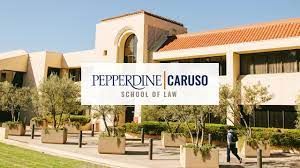Pepperdine Caruso School of Law
"...providing legal services that are responsive to the needs that result from the Pandemic and other disasters impacting our local communities. "

While many practitioners in Texas remember Hurricane Harvey being the event that mobilized many in the legal field, including the courts, to assist in the recovery process, there had been several other events around the nation that marshaled legal resources in innovative ways. One segment of volunteers that took shape was law schools, with both professors and law students offering to help in any way they could. When Superstorm Sandy ravaged the area, Touro Law School stepped up to help on the east coast. In the Gulf of Mexico, you had Hurricane Rita decimate Louisiana, which called to action the volunteers at Loyola Law School in New Orleans. Both law schools created a pipeline of volunteers to help and established a permanent presence within their law schools so students could obtain credit for the work they performed. At the same time, they learned a newly recognized area of law – disaster assistance and recovery.
It was no surprise that leadership from both places was called upon to be part of a network of law schools that wanted to help with the recovery process after Harvey. One of those was Pepperdine Caruso School of Law. Their clinic professors went on to apply the knowledge learned to their disaster recovery after the Thomas Fire tore through their surrounding communities. These experiences also lead to the creation of its own Disaster Relief Clinic.
We feature Pepperdine Caruso School of Law because of its dedication to disaster recovery, including being one of the first clinical programs to contact legal services after Winter Storm Uri swept across Texas. Their clinic is a model example of a partner that complements other legal community efforts during recovery efforts. Additionally, the licensed faculty and students fall within the federal definition of “private attorney involvement,” which requires the expending of federal funds to develop such partnerships to meet our poverty population’s legal demands. Such clinics also provide unique and ever-evolving legal knowledge that will benefit the students as they pursue their careers after law school.
TDLH consulted the clinic faculty and staff for this feature. After being deeply appreciative of the focus on the great work they do, they described their clinic as one that went from a temporary community service program in 2017 to a permanent clinic in 2019. The evolution of the program was primarily due to a generous offer by the Malibu Foundation that provided funds for
“two part-time attorneys to direct the DRC and to supervise and teach law students for the 2019-2020 academic year, along with funds for several stipends for law students to work during the summer of 2019. The clinic improved the lives of most, possibly all, of the clients it helped. At a minimum, through initial evaluations and preliminary work, both the attorneys and student attorneys helped clients to organize, understand and prioritize their problems and provided the clients with a practical step-by-step roadmap of what to do next. Where the client matter was accepted, the clinic provided legal advice and advocacy with successful resolutions for tenant-landlord disputes, insurance coverage, property destroyed by the fire, and compensation from FEMA.”
But they are not done there and continue to improve the model they established by seeking to
“expand the geographic scope of our clinic as well as to pivot into providing legal services that are responsive to the needs that have and may result from the Pandemic and other disasters impacting our local communities. We would like to establish this as an ongoing clinic that will evolve to meet current and unforeseen disasters and crises in California. This would take the form of a Clinic course at the School of Law supervised by two part-time supervising attorneys serving as adjunct professors. Up to ten students in the JD program will enroll in the Clinic as an upper-level elective course in the fall and spring terms. The Clinic will include a weekly seminar component and practice under supervision. The supervising attorneys will be primarily responsible for teaching the seminar component of the Clinic and will supervise the students’ work and observation in the field with clients and parties. In the summer, these students will work as law clerks and receive stipends.”
The Disaster Relief Clinic at Pepperdine Caruso School of Law is a win-win model for students, faculty, legal services, and, more importantly, the poverty population who is trying to recover from a disaster. The legal aid providers that make up the Texas Disaster Legal Help network would like to thank Pepperdine Caruso School of Law for rising to meet the demands of access to justice during disaster recovery and, along the way, establish an exemplary model focusing on the pro bono work that the legal community can provide.